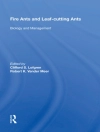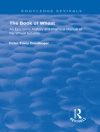Agronomic crops have been a source of foods, beverages, fodders, fuels, medicines and industrial raw materials since the dawn of human civilization. Over time, these crops have come to be cultivated using scientific methods instead of traditional methods. However, in the era of climate change, agronomic crops are increasingly subjected to various environmental stresses, which results in substantial yield loss. To meet the food demands of the ever-increasing global population, new technologies and management practices are being adopted to boost yield and maintain productivity under both normal and adverse conditions.
To promote the sustainable production of agronomic crops, scientists are currently exploring a range of approaches, which include varietal development, soil management, nutrient and water management, pest management etc. Researchers have also made remarkable progress in developing stress tolerance in crops through various approaches. However, finding solutions to meet the growing food demands remains a challenge.
Although there are several research publications on the above-mentioned problems, there are virtually no comprehensive books addressing all of the recent topics. Accordingly, this book, which covers all aspects of production technologies, management practices, and stress tolerance of agronomic crops in a single source, offers a highly topical guide.
Inhoudsopgave
– Growth and Morphological Changes of Agronomic Crops Under Abiotic Stress. - Impact of Climate Variability on Phenology of Rice. - Abiotic Stress Responses and Tolerance Mechanisms for Sustaining Crop Productivity in Sugarcane. - Sugar Beet: A Sustainable Crop for Saline Environment. - Agronomic Crop Responses and Tolerance to Drought Stress. - The Response of Major Food Crops to Drought Stress: Physiological and Biochemical Responses. - Rice Production, Augmentation, Escalation, and Yield Under Water Stress. - Role of Mineral Nutrition in Improving Drought and Salinity Tolerance in Field Crops. - Drought Stress Tolerance in Legume Crops. - Drought Tolerance: Breeding Efforts in Sugarcane. - High-Temperature Response and Tolerance in Agronomic Crops. - Agronomic Crop Responses and Tolerance to Metals/Metalloids Toxicity. - Arsenic Contamination in Major Food Crops: Issues and Mitigation in Indian Subcontinent. - Responses and Tolerance of Cereal Crops to Metal and Metalloid Toxicity Perspective. - Agronomic Crop Responses and Tolerance to Polycyclic Aromatic Hydrocarbon Toxicity. - Gene Pyramiding: An Emerging Control Strategy Against Insect Pests of Agronomic Crops. - Agronomic Crops Response and Tolerance to Allelopathic Stress. - Oxidative Stress in Crop Plants. - Herbicide Resistance in Crops and Weeds. - Improving Crop Health and Productivity: Appraisal of Induced Mutations and Advanced Molecular Genetic Tools. - Use of Biostimulants to Improve Salinity Tolerance in Agronomic Crops. - Abiotic Stress Tolerance in Wheat and the Role of Silicon: An Experimental Evidence. - Molecular Mechanisms Associated with Drought and Heat Tolerance in Plants and Options for Crop Improvement for Combined Stress Tolerance. - Abiotic Stress Tolerance in Field Crops: Integration of Omics Approaches. - Use of QTL in Developing Stress Tolerance in Agronomic Crops. - Abiotic Stress and Applications of Omics Approaches to Develop Stress Tolerance in Agronomic Crops. - The Possible Influence of Climate Change on Agriculture. - Effect of Agricultural Pollution on Crops. - Toxicity of Soil Hydrocarbon Pollution in Field Crops and Its Remediation. - Drought and Heat Stress in Cotton (
Gossypium hirsutum L.): Consequences and Their Possible Mitigation Strategies. - Adverse Effect of Drought on Quality of Major Cereal Crops: Implications and Their Possible Mitigation Strategies.
Over de auteur
Dr. Mirza Hasanuzzaman is a Professor of Agronomy at Sher-e-Bangla Agricultural University in Dhaka. He received his Ph.D. on ‘Plant Stress Physiology and Antioxidant Metabolism’ from Ehime University, Japan. Later, he completed his postdoctoral research at the Center of Molecular Biosciences, University of the Ryukyus, Japan. He was also the recipient of the Australian Government’s Endeavour Research Fellowship for postdoctoral research as an Adjunct Senior Researcher at the University of Tasmania, Australia. Dr. Hasanuzzaman’s current work is focused on the physiological and molecular mechanisms of environmental stress tolerance. He has published over 100 articles in peer-reviewed journals, edited six books and written 30 book chapters. According to Scopus®, Dr. Hasanuzzaman’s publications have received roughly 4, 400 citations with an h-index of 33. He is an editor and reviewer for more than 50 peer-reviewed international journals and was a recipient of the ‘Publons Peer Review Award 2017, 2018, and 2019’. He has been honored by different authorities for his outstanding performance in different fields like research and education, and has received the World Academy of Science Young Scientist Award (2014).












